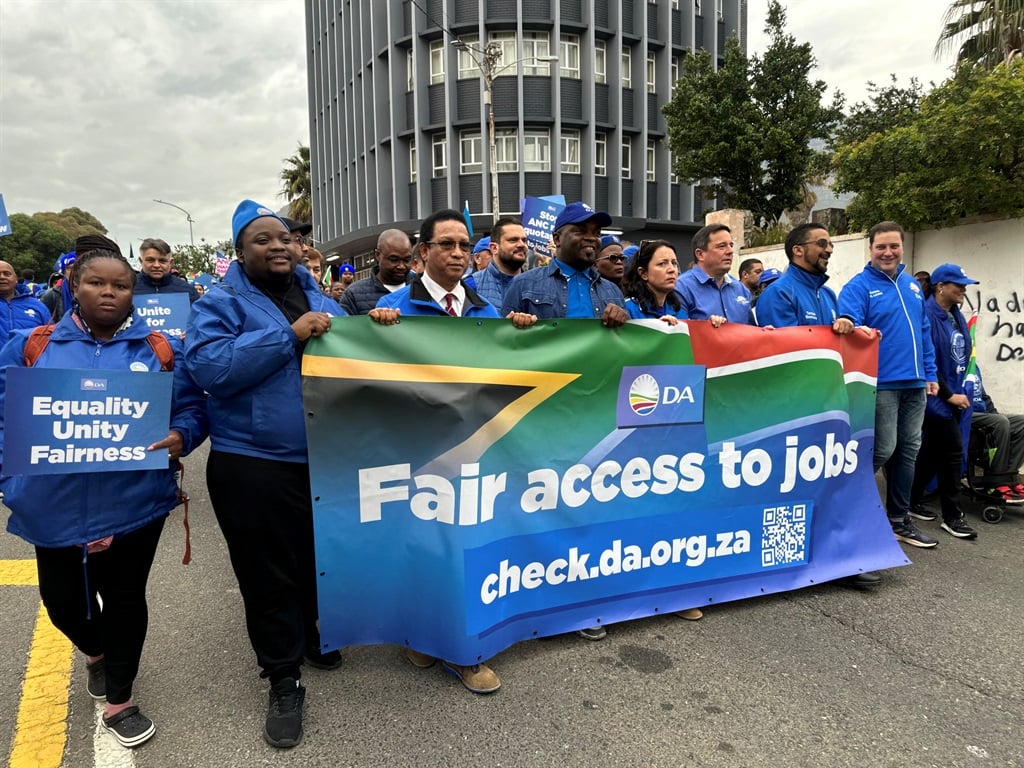
The Democratic Alliance (DA) has expressed strong opposition to the Employment Equity Amendment Act. Bianca van Wyk and Thembalethu Seyisi write that their assertions are far from the truth, but rather part of their malevolent elections campaign.
In South Africa, the topics of affirmative action, black economic empowerment, and employment equity spark intense discussions about reconciliation, equality, and shared prosperity. However, to achieve meaningful progress, we must engage in honest dialogue and reject political exploitation used to perpetuate divisions and hinder progress towards reconciliation and actual redress.
The Employment Equity Amendment Act has been at the centre of debates, with the Democratic Alliance (DA) expressing strong opposition. However, their assertions are far from the truth, but rather part of their malevolent elections campaign.
?? The ANC's Race Quotas Act will completely ban the employment of coloured and Indian South Africans in certain provinces.
— Democratic Alliance (@Our_DA) August 8, 2023
All South Africans deserve fair access to jobs. Act now at https://t.co/RKwTXxdjGi to get help registering to vote and help rescue SA. ????#StopRaceQuotas pic.twitter.com/09kT12z4xp
So, what is the truth? One does not have to look far. The purpose of the Act is unequivocally clear that, among other things, the Act is meant to identify sectoral numerical targets in order to ensure the equitable representation of suitably qualified people from designated groups. These numerical targets and goals cannot be arbitrary.
Section 42 of the Employment Equity Act calls for employers to take into account the demographics of both national and provincial economically active people equitably represented within each occupational category and level in that employer's workforce when developing numerical targets.
The unemployment statistics for the first quarter of 2023 paint a grim picture of the disparities that still persist within the South African workforce. The figures reveal unemployment rates of 35.0% for black African males, 39.9% for black African females, 22.4% for coloured males, 22.4% for coloured females, 10.4% for Indian/Asian males, and 21.1% for Indian/Asian females. Notably, the unemployment rate for white males stands at 5.3%, with white females experiencing an unemployment rate of 10.2%.
Another striking discrepancy emerges when examining who occupies top management positions in South Africa. In 2022, a staggering 62.9% of these positions were occupied by white people, compared to just 16.9% held by black Africans. In contrast, 83.5% of unskilled positions were occupied by black Africans, with only 0.9% of their white counterparts. This disparity highlights the pressing need for proactive efforts to rectify the apartheid-manufactured inequality, but instead, the DA chooses to employ political exploitation under their #StopTheRaceQuotas campaign.
READ | OPINION: Moving forward with Employment Equity: A Practitioner's perspective
The phenomenon of political exploitation by politicians and certain interest groups to resist and undermine initiatives geared towards racial equality is discussed in Professor Carol Anderson’s book, "White Rage: The Unspoken Truth of Our Racial Divide." Anderson explores the concept of political exploitation that arises when resistance against progress towards racial equality can be attributed to a concept she terms "white rage". She examines historical events in the United States to reveal how the white establishment responds with hostility and resistance to redress. It is important to mention that this phenomenon is interrogated in reference to systems and institutions, not white individuals.
The Democratic Alliance using political exploitation in their latest #StopRaceQuotas campaign against the implementation of the Employment Equity Amendment Act includes:
- Exploitation of fear and resentment
Using existing fears and resentment towards perceived racial advancements as threats to status and privileges. The underlying fear of certain Coloured and Indian people being marginalised by a ‘black government’ was exploited by the Democratic Alliance by them homing in on targets in certain provinces. What the Democratic Alliance avoided discussing was the targets for the Western Cape, where the Coloured population would be the largest beneficiaries of the 5-year employment equity targets.
- Manipulating economic anxieties
Weaponising anxieties as tools of political exploitation. By blaming the beneficiaries of redress efforts for economic challenges or job insecurities, bad-faith political actors divert attention from deeper structural issues and scapegoat the beneficiaries. The Democratic Alliance exploited these anxieties by referring to 600 000 job losses in a volatile job market. It is not clear how the party came up with such a specific number. Employers are subject to the Labour Relations Act 66 of 1995, as amended. Any dismissal must be lawful and fair. No employer can justify an irrational and arbitrary termination of employment on account of compliance with employment equity targets.
- Divisive language and dog whistle politics
The use of coded language, known as dog whistles, that appeal to discriminatory sentiments without explicitly stating so. The use of divisive rhetoric attracts support from racially motivated segments of the population while maintaining plausible deniability. By deliberately using the term "race quotas" to refer to "targets”, the Democratic Alliance used language to garner support for their campaign. It was disingenuous to label the introduction of percentages as quotas or to assume that they will be rigidly applied and enforced.
A less than subtle dog whistle by the party's leader, John Steenhuisen, was referring to employment equity targets as the "resurrection of apartheid-era racial divisions". This dog whistle would have found resonance with those individuals that still believe in the fallacies of "reverse apartheid" or “reverse discrimination".
- Resistance to equality and social progress when it comes to deconstructing systems of privilege.
In an attempt to avoid discussing current inequality in South Africa, the Democratic Alliance's arguments against the Act placed emphasis on individual meritocracy and colour-blindness. The EEA states that individuals that are considered for the purposes of employment equity targets should be suitably qualified.
It is also worth highlighting that South Africa is not alone in the journey of transforming its labour force and recognising that removing the legal bars to equality of treatment is not enough. Elsewhere in the world, Canada is on the same journey through their Employment Equity Act.
The latter, much like South Africa's legislation, aims to achieve equality in the workplace so that no person shall be denied employment opportunities or benefits for reasons unrelated to ability and, in the fulfilment of that goal, to correct the conditions of disadvantage in employment experienced by women, Aboriginal peoples, persons with disabilities and members of visible minorities by giving effect to the principle that employment equity means more than treating persons in the same way but also requires special measures and the accommodation of differences.
Section 10(2) of Canada's Employment Act requires the establishment of numerical goals, too and takes into account similar factors found in section 42 of our Employment Equity Act. Anyway, the Amendment Act does not operate in isolation. It is part of a compendium of laws, including the Basic Conditions of Employment Act and the National Minimum Wage Act.
The arguments put by the DA against the Act, overlook historical context, misinterpret the purpose, and are also antithesis to the universal aspiration of social justice, which is concerned with the fair and equitable treatment of individuals and social groups.
Social justice goes hand in hand with addressing poverty, ensuring fairness and equality, respecting human rights, and inclusion of the marginalised, which the Act, properly implemented, has the potential to advance.
Instead of cementing itself as an honest opposition that promotes inclusivity and builds a stronger, more equitable society for all South Africans, the DA sadly chooses political exploitation. This must be condemned.
- Bianca van Wyk is a professional training consultant, who is deeply committed to the principles of active citizenry and advocating for social justice. She writes in her personal capacity.
- Thembalethu Seyisi is a Social Justice Ambassador and a candidate attorney. He writes in his personal capacity.
*Want to respond to the columnist? Send your letter or article to opinions@news24.com with your name and town or province. You are welcome to also send a profile picture. We encourage a diversity of voices and views in our readers' submissions and reserve the right not to publish any and all submissions received.
Disclaimer: News24 encourages freedom of speech and the expression of diverse views. The views of columnists published on News24 are therefore their own and do not necessarily represent the views of News24.




 Publications
Publications
 Partners
Partners
























